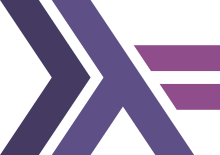ภาษาแฮสเคิล
ภาษาแฮสเคิล (อังกฤษ: Haskell) /ˈhæskəl/[27] เป็นภาษาโปรแกรมที่มีวัตถุประสงค์เพื่อใช้การใช้งานที่หลากหลาย (general-purpose) ที่มีการไทป์แบบคงที่ (statically typed) ภาษาแฮสเคิลเป็นภาษาโปรแกรมเชิงฟังก์ชั่นแบบบริสุทธ์ (purely functional programming language) ที่มีลักษณะพิเศษคือการคาดคะเนไทป์ (type inference) และการประเมินผลแบบขี้เกียจ (lazy evaluation).[28][29] ภาษาแฮสเคิลพัฒนาขึ้นเพื่อการเรียนการสอน การวิจัย รวมไปถึงการประยุกต์ใช้ในเชิงธุรกิจและอุตสาหกรรม ภาษาแฮสเคิลเป็นแรงบันดาลใจให้กับภาษาโปรแกรมอื่น ๆ ที่มีความซับซ้อนอีกหลายภาษาให้มีฟีเจอร์แบบไทป์คลาส (type classes) ซึ่งทำให้ป้องกันการเออเรอร์ของไทป์ ทำให้การโอเปอเรเตอร์โอเวอร์โหลดดิ้ง (operator overloading) มีความปลอดภัยในการใช้ไทป์ หรือ มีไทป์เซฟตี้ (type-safe) มากขึ้น คอมไพเลอร์หลักสำหรับภาษาแฮสเคิลคือ คอมไพเลอร์กลาสโกลว์แฮสเคิล (Glasgow Haskell Compiler หรือ GHC) ภาษาแฮสเคิลตั้งชื่อตามนักตรรกศาสตร์ชาวอเมริกัน แฮสเคิล เคอร์รี่ (Haskell Curry)[1]
อรรถศาสตร์ (semantics) หรือ คำต่าง ๆ ที่ใช้โค้ดภาษาแฮสเคิลมีต้นกำเนิดทางประวัติศาสตร์จากภาษามิแรนด้า (Miranda) ซึ่งเป็นภาษาที่กลุ่มนักวิทยาศาสตร์คอมพิวเตอร์ที่ร่วมกันสร้างภาษาแฮสเคิลใช้ในการต่อยอด[30] การกำหนดคุณลักษณะอย่างเป็นทางการสำหรับภาษาแฮสเคิลครั้งสุดท้ายมีขึ้นในเดือนกรกฎาคม ค.ศ.2010 (พ.ศ.2553) ส่วนการพัฒนาคอมไพเลอร์ GHC นั้นมีการปรับปรุงและพัฒนาอยู่เรื่อยมาและทำการขยายศักยภาพของภาษาแฮสเคิลขึ้นไปเรื่อย ๆ

มีการใช้ภาษาแฮสเคิลในการวิจัยเชิงวิชาการ[31][32] และภาคธุรกิจอุตสาหกรรมต่าง ๆ[33][34] ในเดือนกันยายน ค.ศ.2020 (พ.ศ.2563) แฮสเคิลเป็นภาษาที่ได้รับความนิยมในการค้นใน Google เป็นอันดับที่ 28[35] ในส่วนของผู้ใช้ที่ยังแอคทีฟอยู่บนแพลตฟอร์ม GitHub ในส่วนของ source code repository มี source code ภาษาแฮสเคิลเพียง 1% เท่านั้น
ตัวอย่างโค้ด
[แก้]การเขียนโปรแกรม "Hello, World!" program ใน Haskell (only the last line is strictly necessary):
module Main (main) where -- not needed in interpreter, is the default in a module file
main :: IO () -- the compiler can infer this type definition
main = putStrLn "Hello, World!"
การเขียนฟังก์ชั่นแฟกทอเรียล (factorial) ในแฮสเคิลสามารถเขียนได้หลายแบบ:
-- Type annotation (optional, same for each implementation)
factorial :: (Integral a) => a -> a
-- Using recursion (with the "ifthenelse" expression)
factorial n = if n < 2
then 1
else n * factorial (n - 1)
-- Using recursion (with pattern matching)
factorial 0 = 1
factorial n = n * factorial (n - 1)
-- Using recursion (with guards)
factorial n
| n < 2 = 1
| otherwise = n * factorial (n - 1)
-- Using a list and the "product" function
factorial n = product [1..n]
-- Using fold (implements "product")
factorial n = foldl (*) 1 [1..n]
-- Point-free style
factorial = foldr (*) 1 . enumFromTo 1
อ้างอิง
[แก้]- ↑ 1.0 1.1 Hudak et al. 2007.
- ↑ Marlow, Simon (24 November 2009). "Announcing Haskell 2010". Haskell (Mailing list). สืบค้นเมื่อ 12 March 2011.
- ↑ Riedel, Herbert (28 April 2016). "ANN: Haskell Prime 2020 committee has formed". Haskell-prime (Mailing list). สืบค้นเมื่อ 6 May 2017.
- ↑ 4.00 4.01 4.02 4.03 4.04 4.05 4.06 4.07 4.08 4.09 4.10 4.11 4.12 Peyton Jones 2003, p. xi
- ↑ Norell, Ulf (2008). "Dependently Typed Programming in Agda" (PDF). Gothenburg: Chalmers University. สืบค้นเมื่อ 9 February 2012.
- ↑ Hudak et al. 2007, pp. 12–38, 43.
- ↑ Stroustrup, Bjarne; Sutton, Andrew (2011). "Design of Concept Libraries for C++" (PDF). คลังข้อมูลเก่าเก็บจากแหล่งเดิม (PDF)เมื่อ 10 February 2012.
{{cite journal}}: Cite journal ต้องการ|journal=(help) - ↑ 8.00 8.01 8.02 8.03 8.04 8.05 8.06 8.07 8.08 8.09 Hudak et al. 2007, pp. 12-45–46.
- ↑ 9.0 9.1 Meijer, Erik (2006). "Confessions of a Used Programming Language Salesman: Getting the Masses Hooked on Haskell". Oopsla 2007. CiteSeerX 10.1.1.72.868.
- ↑ Meijer, Erik (1 October 2009). "C9 Lectures: Dr. Erik Meijer – Functional Programming Fundamentals, Chapter 1 of 13". Channel 9. Microsoft. คลังข้อมูลเก่าเก็บจากแหล่งเดิมเมื่อ 2012-06-16. สืบค้นเมื่อ 9 February 2012.
- ↑ Drobi, Sadek (4 March 2009). "Erik Meijer on LINQ". InfoQ. QCon SF 2008: C4Media Inc. สืบค้นเมื่อ 9 February 2012.
{{cite news}}: CS1 maint: location (ลิงก์) - ↑ Hickey, Rich. "Clojure Bookshelf". Listmania!. คลังข้อมูลเก่าเก็บจากแหล่งเดิมเมื่อ 3 October 2017. สืบค้นเมื่อ 3 October 2017.
- ↑ Heller, Martin (18 ตุลาคม 2011). "Turn up your nose at Dart and smell the CoffeeScript". InfoWorld. สืบค้นเมื่อ 2020-07-15.
- ↑ "Declarative programming in Escher" (PDF). สืบค้นเมื่อ 7 October 2015.
- ↑ Syme, Don; Granicz, Adam; Cisternino, Antonio (2007). Expert F#. Apress. p. 2.
F# also draws from Haskell particularly with regard to two advanced language features called sequence expressions and workflows.
- ↑ Wechsung, Ingo. "The Frege Programming Language" (PDF). สืบค้นเมื่อ 26 February 2014.
- ↑ "Facebook Introduces 'Hack,' the Programming Language of the Future". WIRED. 20 March 2014.
- ↑ "Idris, a dependently typed language". คลังข้อมูลเก่าเก็บจากแหล่งเดิมเมื่อ 2021-05-11. สืบค้นเมื่อ 26 October 2014.
- ↑ "LiveScript Inspiration". สืบค้นเมื่อ 4 February 2014.
- ↑ Freeman, Phil (2016). "PureScript by Example". Leanpub. สืบค้นเมื่อ 23 April 2017.
- ↑ Kuchling, A. M. "Functional Programming HOWTO". Python v2.7.2 documentation. Python Software Foundation. สืบค้นเมื่อ 9 February 2012.
- ↑ "Glossary of Terms and Jargon". Perl Foundation Perl 6 Wiki. The Perl Foundation. คลังข้อมูลเก่าเก็บจากแหล่งเดิมเมื่อ 21 January 2012. สืบค้นเมื่อ 9 February 2012.
- ↑ "The Rust Reference: Appendix: Influences". สืบค้นเมื่อ 3 February 2016.
- ↑ Fogus, Michael (6 August 2010). "MartinOdersky take(5) toList". Send More Paramedics. สืบค้นเมื่อ 9 February 2012.
- ↑ Lattner, Chris (3 June 2014). "Chris Lattner's Homepage". Chris Lattner. สืบค้นเมื่อ 3 June 2014.
The Swift language is the product of tireless effort from a team of language experts, documentation gurus, compiler optimization ninjas, and an incredibly important internal dogfooding group who provided feedback to help refine and battle-test ideas. Of course, it also greatly benefited from the experiences hard-won by many other languages in the field, drawing ideas from Objective-C, Rust, Haskell, Ruby, Python, C#, CLU, and far too many others to list.
- ↑ "Timber/History". คลังข้อมูลเก่าเก็บจากแหล่งเดิมเมื่อ 2020-10-31. สืบค้นเมื่อ 7 October 2015.
- ↑ Chevalier, Tim (28 January 2008). "anybody can tell me the pronunciation of "haskell"?". Haskell-cafe (Mailing list). สืบค้นเมื่อ 12 March 2011.
- ↑ Type inference originally using Hindley-Milner type inference
- ↑ Peyton Jones 2003.
- ↑ Edward Kmett, Edward Kmett – Type Classes vs. the World
- ↑ "Haskell in education". สืบค้นเมื่อ 15 February 2016.
- ↑ "Haskell in research". สืบค้นเมื่อ 15 February 2016.
- ↑ Mossberg, Erik (2020-06-08), erkmos/haskell-companies, สืบค้นเมื่อ 2020-06-22
- ↑ "Haskell in industry - HaskellWiki". wiki.haskell.org. สืบค้นเมื่อ 2020-06-22.
- ↑ "PYPL PopularitY of Programming Language index". pypl.github.io (ภาษาอังกฤษ). 22 January 2021. คลังข้อมูลเก่าเก็บจากแหล่งเดิมเมื่อ 17 September 2020. สืบค้นเมื่อ 22 January 2021.
